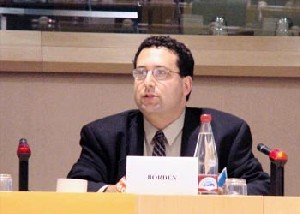Editorial:
A
Basic
Question
of
Fairness
3/3/06
David Borden, Executive Director, [email protected]
Overall that is probably still the case. But for reformers in those places it is all still relative. In Canada, for example, the government's stated intention to decriminalize marijuana never materialized, and the bills that were most likely to pass were a mixed blessing at best. Medical marijuana refugee Steve Kubby was sent back to California despite apparent danger to his life without medical marijuana in the prisons of a state that is supposed to allow medical marijuana. Now, with a conservative government taking the reins (for reasons unrelated to drug policy), reform has probably gotten as far as its going to get for a little while, though time will tell. Hopes that the government would refuse on human rights grounds to extradite marijuana seed entrepreneur/activist Marc Emery to the US seem a longer shot now. And criticisms of politicization in the Emery maneuver -- larger seed sellers who were not supporting the legalization movement had not been targeted -- may be blunted somewhat with the takedown late last month of the outfit Heaven's Stairway, though on Canada's own initiative, not the DEA's. One could argue that Canadian seed vendors knowingly risked legal consequences, that laws even if bad ones were on the books and they knew about them, that people like Emery as well as the less ideological proprietors of Heaven's Stairway had to know there was a chance that sooner or later the government would move against them. But there's a basic question of fairness that is thereby missed. For years, almost a decade in fact, Emery and others have operated their businesses with no attempt at secrecy -- in Emery's case literally from open storefronts on Hastings Street in the heart of downtown Vancouver. Authorities' long-term inaction on that knowledge constituted a kind of consent to it, an implicit message that Canada really didn't have an interest in going after marijuana and that the hammer really wasn't going to come down on these people very hard if it did. When Canada's political leaders and law enforcement agencies decided to take a different course, a more honorable way for them to do it would have been to tell Emery and others that things had changed, that it was time to stop, that past activities that everybody knew about wouldn't be used against them so long as they did stop. Instead, people are facing hard time in US and Canadian prisons. Law or not, that's an unfair manner of applying the law, because a law and its implementation (or lack thereof) are ultimately inseparable. Canadian authorities should grant an amnesty for the past seed selling that they green-lighted for so long, if the law is to operate with fairness. If not, then those same authorities who gave the green light should themselves be punished, and just as harshly, if the law is to operate with equality. Canada's law recognizes that principles of human rights are not always black and white and that the letter of the law can sometimes conflict with them. Reformers have rightfully invoked that principle on this occasion. I believe that over time the drug war will be recognized as the massive violation of human rights that it is. Even with its politics changed, I hope that Canada will stand on that idea sooner rather than later.
| |||||||||||||||||||||||||||||||||||||||||||||||||||||||||||||||||||||||||||||

